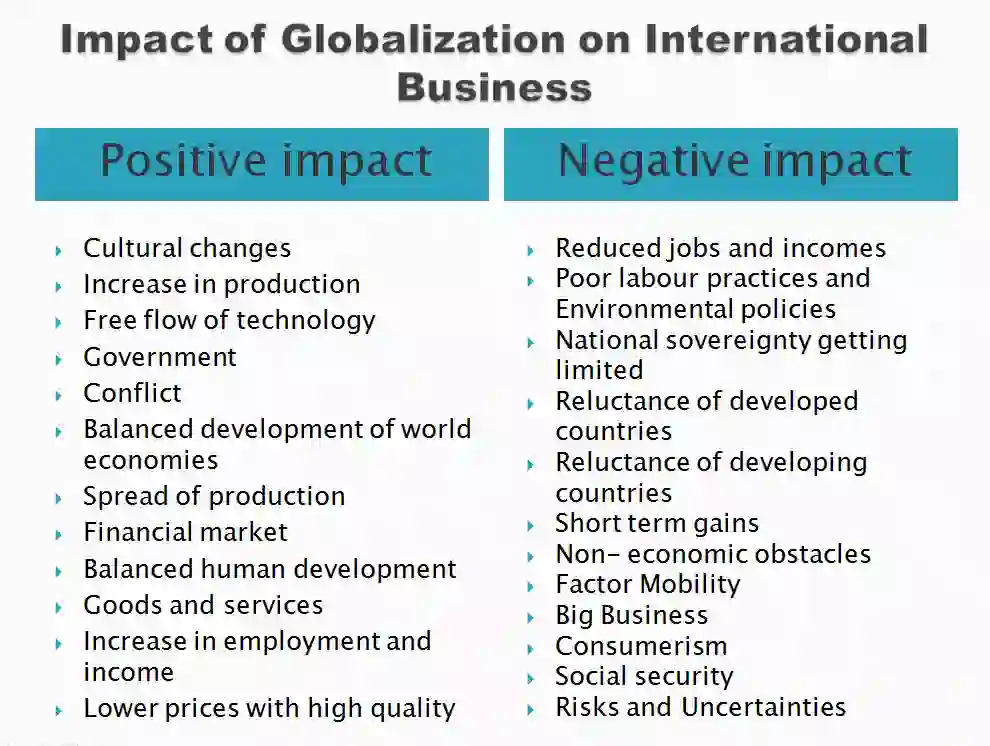There are various magnitudes of globalisation affecting the natural, local, national, and finally global environment. It directly influences human development. The Impact of globalisation on international business can be studied in the following terms:
- Positive Impact of Globalisation
- Negative Impact of Globalisation
1) Positive Impact of Globalisation
The positive impact of globalisation on world trade can be explained with the help of the following points:
- Cultural Exchange and Demand for a Variety of Products
- Increase in Production and Consumption
- Free Flow of Technology
- Government
- Conflict
- Balanced Development of World Economies
- Spread up of Production Facilities Throughout the Globe
- Financial Markets
- Balanced Human Development
- Goods and Services
- Increase in Employment and Income
- Lower Prices with High Quality
i) Cultural Exchange and Demand for a Variety of Products
Globalisation reduces the physical distance between countries and enables people of different countries to acquire the culture of other countries. The cultural exchange, in turn, makes the people demand a variety of products which are being consumed in other countries. For example, the demand for American pizza’ in India and the demand for ‘Masala dosa’ and ‘Hyderabadi biryani’ and Indian-styled garments in USA and Europe.
ii) Increase in Production and Consumption
Increased industrialisation in the globe leads to an increase in production and thus results in balanced industrial development along with an increase in income which enhances the levels of consumption.
iii) Free Flow of Technology
As stated earlier, globalisation helps the flow of technology from advanced countries to developing countries. It helps developing countries implement new technology.
iv) Government
By connecting people to the outside world, globalisation breaks down isolation. Advocates claim that instant people-to-people communication spreads democracy and leads to the fall of dictatorships (e.g. Milosevic in Serbia).
Related Articles:
- nature of business meaning
- nature of international business
- scope of international marketing
- determinants of economic development
- nature of capital budgeting
- nature of international marketing
v) Conflict
The more economically interdependent the world becomes, the more people will trade and communicate with each other. This leads to inherent stability, where disputes are more likely to be resolved peacefully (e.g., the European Union).
vi) Balanced Development of World Economies
With the flow of capital, technology, and manufacturing facilities in developing countries, developing countries industrialise their economies. This in turn leads to the balanced development of all the nations.
vii) Spread up of Production Facilities Throughout the Globe
As stated earlier, the globalisation of production leads to the spread of manufacturing facilities in all the global countries depending upon the location and various favourable production factors.
viii) Financial Markets
Economic growth requires investment capital. Globalised capital markets attract investors to the most favourable financial markets and “hot growth” economies, thereby allowing investors to maximise their return.
ix) Balanced Human Development
An increase in industrialisation on balanced lines around the globe improves the skills of the people of developing countries. Further, the increased economic development of the country enables the government to provide welfare facilities like a hospital: educational institutes etc.. which in turn contributes to balanced human development across the globe.
x) Goods and Services
As markets become global, more goods and services are made available at a lower cost to a wider group of people. More access leads to an increase in consumer demand and improved standards of living. In addition, global competition and cheap imports keep a lid on prices, so that inflation is less likely to derail economic growth.
xi) Increase in Employment and Income
Globalisation results in a shift of manufacturing facilities to low-wage developing countries. As such, it reduces job opportunities in developed countries and alternatively creates job opportunities in developing countries. For example, Harwood Industries (a US cloth manufacturer) shifted its operations from the US (paying wages of 5′ per hour) to Honduras (wage rate was 48 cents per hour).
xii) Lower Prices with High Quality
Indian consumers have already been getting products of high quality at lower prices. Increased industrialisation, the spread of technology, and increased production and consumption levels enable companies to produce and sell products of high quality at lower prices.
2) Negative Impact of Globalisation
The negative impact of globalisation on world trade can be explained with the help of the following points:
- Reduced Jobs and Incomes
- Poor Labour Practices and Environmental Policies
- National Sovereignty Getting Limited
- Reluctance of Developed Countries
- Reluctance of Developing Countries
- Short-Term Gains
- Non-Economic Obstacles
- Factor Mobility
- Big Business
- Consumerism
- Social Security
- Risks and Uncertainties
i) Reduced Jobs and Incomes
One major criticism against globalisation is that compared to creating jobs it destroys manufacturing jobs in countries like India and China. These critics argue that falling trade barriers allow firms to move their manufacturing activities to countries where wage rates are much lower.
ii) Poor Labour Practices and Environmental Policies
One of the criticisms against globalisation is that free trade encourages developed nations to move manufacturing facilities off-shore to less developed countries that lack fine regulations to protect labour and the environment. They feel that free trade can lead to an increase in pollution and exploitation of the labour of less developed nations.
iii) National Sovereignty Getting Limited
With the development of the WTO (World Trade Organisation) and other multilateral organisations, countries and localities necessarily give up some authority over their actions. If a nation wanted to retreat into a more protectionist position, it could choose to withdraw from its international agreements.
iv) Reluctance of Developed Countries
While advocating the advantages of a free market mechanism and competitive markets, the rich economies of the world are themselves riddled with all sorts of distortions due to monopoly forces, a variety of vested interests and huge subsidies. They are not ready to accommodate the poorer nations of the world on criteria of economic fairness.
v) Reluctance of Developing Countries
Developing countries have had bitter experiences of being forced into making trade and non-trade concessions to developed countries, often at the cost of their interests. They realise that with them the developed nations want to have ‘free trade’ and not ‘fair trade’. Developed countries continually keep finding new reasons to increase the trade imbalances faced by developing nations.
vi) Short-Term Gains
Though several economists from developed countries have been arguing that long-run sustainable growth and prosperity of the developed countries can be ensured only by the growing prosperity of the developing countries, the former is not ready to adopt and pursue this approach. Instead, they are always eagerly looking for opportunities to reap short-term gains.
vii) Non-Economic Obstacles
The process of economic integration inherently necessitates a corresponding compromise of national sovereignty, which becomes even more pronounced in the case of global economic integration. This poses a challenging and often unacceptable decision for national governments.
viii) Factor Mobility
Globalisation necessitates unhindered international factor mobility. Developing countries are concerned that the unrestricted mobility of capital and finance can have detrimental effects on their economies. On the other hand, developed countries are apprehensive about the effects of unrestricted immigration of low-wage labour.
ix) Big Business
Big corporate entities of business tend to kill competition and dominate markets. Developing countries are apprehensive that such practices would inflict long-term damage and large-scale to their small-scale and cottage industries, agriculture, and employment.
x) Consumerism
Consumerism is a concern for developing nations, as they fear that unrestricted globalization may exacerbate the matter and hinder domestic savings and capital accumulation. A nation with a low per capita income cannot afford to let this happen.
xi) Social Security
With the increase in globalisation social security is becoming increasingly challenging for governments, especially those in developing countries. it becomes increasingly difficult for a government to create and finance a social security system, particularly in a developing country. Such provisions tend to lose their priority in market-oriented globalisation.
xii) Risks and Uncertainties
Risks and uncertainties pose significant barriers to the progress of globalization. Member countries and MNCs need to address these uncertainties and work towards a more stable and accepting global market. Progress towards globalisation is restricted by uncertainties relating to a possible shift in the political and economic philosophy of some member countries; the fear of nationalisation by the MNCs, the resistance to cultural invasion associated with the unrestricted inflow of foreign capital and enterprise, and so on.

You May Also Like:-
